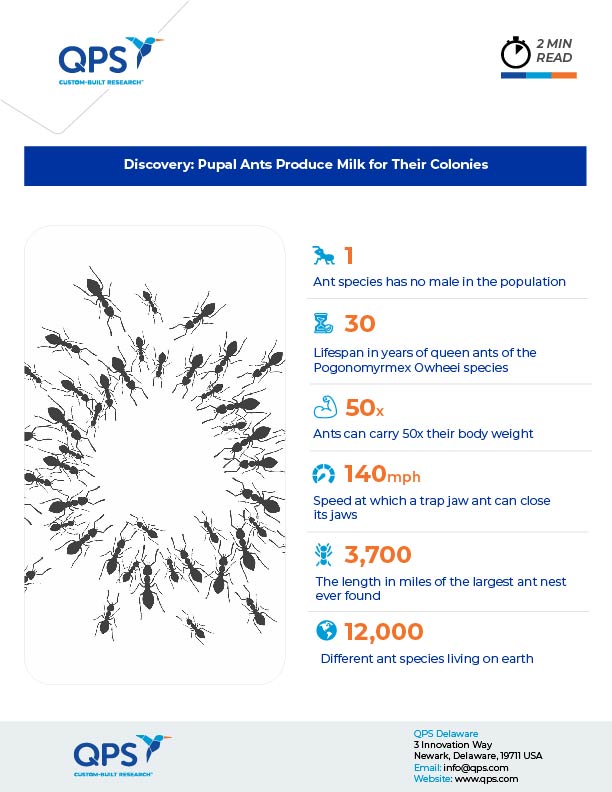Pupating ants produce milk — and scientists have only just noticed. Research published in Nature in November describes researchers observing for the first time that during their otherwise inactive pupal stage, ant pupae secrete a nourishing, milk-like secretion that not only helps increase the chances of the pupae’s survival but also provides nourishment for the entire ant colony.
Pupal Development
Until recently, ant pupae have been regarded as completely passive members of the colony. But researchers at Sorbonne Paris North University, France, have discovered that pupal ants produce milk that is used to ensure the fitness of the entire colony.
As Orli Snir, biologist at the Rockefeller University in New York City and study co-author, explains, “We identified a mechanism that unites the colony, binding ants across developmental stages — adults, larvae and pupae — into a coherent entity, the superorganism.”
How Researchers Noticed That Pupal Ants Produce Milk
To learn what contributes to the cohesive integration of eusocial insects like ants, Snir and her colleagues observed clonal raider ants (Ooceraea biroi) in isolation at different life stages: larval, pupal, and adult.
During the larval stage, newly hatched ants are tiny, worm-like, and depend completely on the colony to provide them with food and protection. They remain in the larval stage through several cycles of growing and molting exoskeletons before entering the pupal stage.
The pupal stage is the developmental stage between the larval and adult stages in the life cycle of ants. During the pupal stage, the ant’s body is completely immobile, enclosed in a cocoon made of silk or other ant-produced materials, as it undergoes the significant changes needed in order to transform from a larva into an adult. During this stage, known as metamorphosis, the ant’s body is reorganized, and its internal organs and external features take on their final form. Once the pupal stage is complete, the ant will emerge as a fully-formed adult.
While observing ants in the pupal stage, Snir and her colleagues noticed something never before documented: pupal ants secreted a fluid onto their abdominal tips. When this fluid was not removed by adult ants, it would build up and become contaminated, drowning the pupae. But when it was removed, the pupae could survive
But for Snir and her team, even more surprising than the existence of this pupal secretion was the purpose it played in the colony. By tracing the fluid, the researchers learned that adult ants do not just remove the fluid from the pupal ants, but that in fact, adult ants drink the fluid and bring their larvae to the pupae to drink the fluid as well.
This pupal “milk,” therefore, provides colony-wide benefits to ants. Adult ants rapidly remove the milk, both to drink it and to feed it to larval ants. Newly hatched larvae depend on this milk, which is rich in nutrients, hormones, and neuroactive substances, to grow and survive. And the process of adult ants rapidly removing milk prevents the kind of dangerous fluid build-up that can be fatal to pupal ants.
Future Research
Following their initial discovery with clonal raider ants, the researchers expanded their research and also detected pupal “milk” in species from each of the five biggest ant subfamilies. As they look ahead, the team next wants to study the effects that pupal secretions might have on both adults and larvae in terms of behavior and physiology. As Daniel Kronauer, Rockefeller University biologist and study co-author, said, “Whether larvae [develop] into queen or worker might be modulated by how much access they have to this fluid.”
QPS is a GLP- and GCP-compliant contract research organization (CRO) delivering the highest grade of discovery, preclinical and clinical drug research development services. Since 1995, it has grown from a tiny bioanalysis shop to a full-service CRO with 1,100+ employees in the U.S., Europe and Asia. Today, QPS offers expanded pharmaceutical contract R&D services with special expertise in neuropharmacology, DMPK, toxicology, bioanalysis, translational medicine and clinical development. An award-winning leader focused on bioanalytics and clinical trials, QPS is known for proven quality standards, technical expertise, a flexible approach to research, client satisfaction and turnkey laboratories and facilities. Through continual enhancements in capacities and resources, QPS stands tall in its commitment to delivering superior quality, skilled performance and trusted service to its valued customers. For more information, visit www.qps.com or email [email protected].






